Colonel Anil A Athale (retd)
'Sadly, frightening the minority and dividing the majority has become the favoured electoral strategy of the ruling dispensation. This would have been less of a disaster for the country if the principal Opposition party had a sensible counter.'
'Instead, the principal Opposition party is forever trying to create a vote bank of the 'majority,' says Colonel Anil A Athale (retd).
Many long-term observers and students of internal security issues that India is facing were stunned by Home Minister Sushilkumar Shinde's recent revelations at a Jaipur meeting.
The home minister made three points:
- There are terrorist training camps in India.
- These are being run by a political party and a social organisation associated with it (the names are immaterial) that has over a few million members.
- It is an instance of 'Hindu terror'.
If the home minister had information about these camps he is duty bound to take action against these camps and organisations that are carrying out these activities.
The organisations responsible must be declared 'unlawful' (such as the Students Islamic Movement of India or Indian Mujahideen or United Liberation Front of Asom) and its members arrested.
But subsequent justification of his remarks as well as statements by the home secretary did not bring out any new facts. What he mentioned to justify his conclusions were four instances of bomb blasts, namely on the Samjhauta Express, Malegaon, Mecca Masjid in Hyderabad and Ajmer.
Some individuals who had links with these crimes have been arrested, but their trial is yet to begin and no charge sheet has been framed as yet. On this basis, the home minister also raised the bogey of 'Hindu Terror'.
Please ...
Thousands have died in these attacks in the last 10-15 years
Image: The Taj Mahal hotel, November 29, 2008, the morning the horrific Mumbai attacks finally came to an end.Photographs: Arko Dutta/Reuters
On the other hand, India has been facing a terror campaign launched from across the border for the last 10 to 15 years.
Thousands of people have died in these attacks; the most horrendous among them were the Mumbai train blasts, the Delhi, Ahmedabad, Jaipur and the Pune blasts in which over a thousand people have lost their lives.
Sixteen people died and over 120 people were injured in the double blasts in Hyderabad on Thursday.
There has not been a single conviction as yet. It is widely believed that these terror acts were carried out by terrorists from a neighbouring country with some local support.
Enraged by these repeated attacks targetting a particular community and the government's inability to deal with the issue effectively, some citizens decided to take the law into their own hands and reply with 'bombs for bombs'.
This is totally unacceptable and the guilty must be punished by following due process of law. But there is a need to introspect as to why some citizens have been driven to desperation.
In the United States as well, post the 9/11 attack, some Americans similarly indulged in violence directed at Muslims (or those who looked like one).
Rightly, these were universally condemned and the culprits have been punished. These are essentially 'hate' crimes. The incidents at Malegaon et al are similar in nature. But nobody in the world or the US calls it 'Christian terror'.
Knowing all this, it was indeed a mystery as to why the home minister chose to raise the bogey of 'Hindu Terror' at this juncture.
Please ...
Was Shinde's comment a balancing act for hanging Afzal Guru?
Image: Commandos take up positions outside Parliament House, following the terrorist attack, December 13, 2001.Photographs: Ranjan Basu/Saab Press
Within a few weeks, the home minister's motives became clear. It seems he was creating the right 'atmosphere' for the decision to hang the Parliament attack culprit.
So to balance the punishment to a terrorist of one community, he felt it necessary to criticise the other community as well.
Before we further analyse the 'communal balancing' (also called secularism by some) it is necessary to deal with the issue of the death sentence to the conspirator of the Parliament attack of December 13, 2001.
After the death sentence carried out on the conspirator of the 2001 Parliament attack, there has been the usual spectacle of 'sympathy' for the perpetrator of the crime. Aside from the brave staff of the Parliament killed in this episode, it also triggered a series of events in the subcontinent.
Public memory is notoriously short, but in the aftermath of the attack, India and Pakistan nearly went to war. American intervention, some good sense on Pakistan's part and sheer luck averted a war.
If war had taken place, the use of nuclear weapons was a grave possibility.
Please ...Did Pak sleeper cells carry out the 2002 Godhra train attack?
Image: The burnt train compartment, Godhra, February 2002.Photographs: Reuters
Had there been war, close to several million people would have died on both sides of the border.
During the mobilisation India lost close to 600 soldiers.
As a diversion from the tension on the border, Pakistani sleeper cells carried out the 2002 Godhra train attack, which led to rioting in Gujarat. Both these events led to the deaths of over 2,000 people.
The decision to hang the Parliament attack plotter was a logical one and had been reached after due process of law. What was most shocking was the communal colour that the home minister gave to the exercise.
Sadly, frightening the minority and dividing the majority has become the favoured electoral strategy of the ruling dispensation. This would have been less of a disaster for the country if the principal Opposition party had a sensible counter.
Instead, the principal Opposition party is forever trying to create a vote bank of the 'majority'. As a sensible counter to this cynical ploy, the Opposition ought to reassure the minority, a task in which it has failed miserably.
The habit of 'balancing' goes back to the days when then prime minister Indira Gandhi promoted Jarnail Singh Bhindranwale to checkmate the Akalis. Rajiv Gandhi followed this with his Shah Bano case surrender and Ram Janambhoomi shilanyas. The BJP tried to balance Mandal with Kamandal.
In all these cases, the nation paid a very heavy price in terms of disturbed internal peace. The present home minister seems intent on playing the same game that has dubious electoral advantage!
Please ...
We have outdone the British in divide and rule
Image: Women from the Shi'ite Hazara community attend the funerals of victims killed by a bomb blast in Quetta.Photographs: Naseer Ahmed/Reuters
The home minister talking of 'Hindu' terror has defamed the world's oldest and peaceful faith that has a history of tolerance and acceptance of pluralism.
Does the home minister want Hindus subjected to racial profiling based on faith when they travel abroad?
This is the repercussion of his statement and I and 80 per cent population of this country are directly and adversely affected.
In 2008, a group of terrorists trained in camps run by the Lashkar-e-Tayiba attacked targets in Mumbai and killed over 166 Indians and some foreign citizens. It was sheer luck and the courage of a Mumbai policeman Tukaram Ombale that we caught one perpetrator alive.
Despite this, the neighbouring country from where he came, denied his links. For the last 15 years, India has been subjected to this terror campaign by non-State actors backed by State intelligence and the armed forces of our neighbour.
In the future, when an attack similar to the one in Mumbai or Delhi takes place, the perpetrators are going to point to the home minister's statement and claim that it is a case of 'home-grown' Hindu terror.
Already, terrorists in the neighbouring country have demanded that the United Nations take cognisance of terror camps on Indian soil and declare India a terrorist State!
The irony is that just as home minister was busy sowing antagonism between communities, in the neighbouring country hundreds lost their lives in targetted sectarian killing in Quetta.
Just as the minorities in India were realising that they were far more secure in a plural country like India, a minister from the Union council of ministers chose to stoke fear and promote hatred and conflict.
Sadly, it seems we seem to have outdone our former colonial masters in divide and rule.
Colonel Anil A Athale (retd) is a former Fellow on internal security, United Service Institution, and co-ordinator, Initiative for Peace and Disarmament.

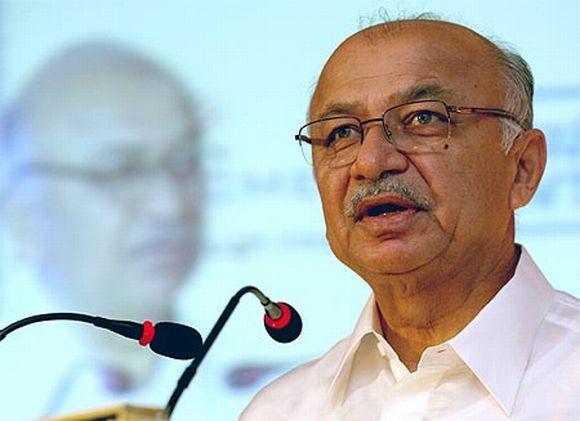
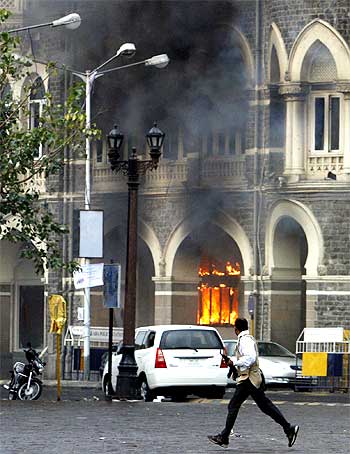
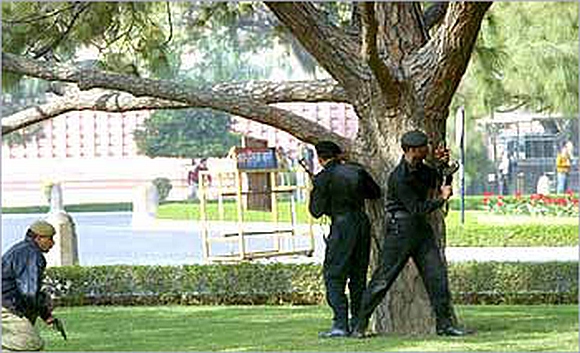
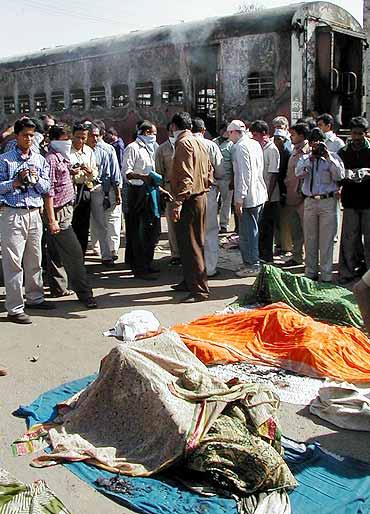
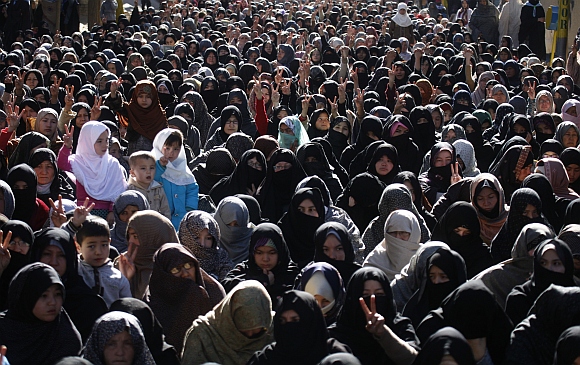
article